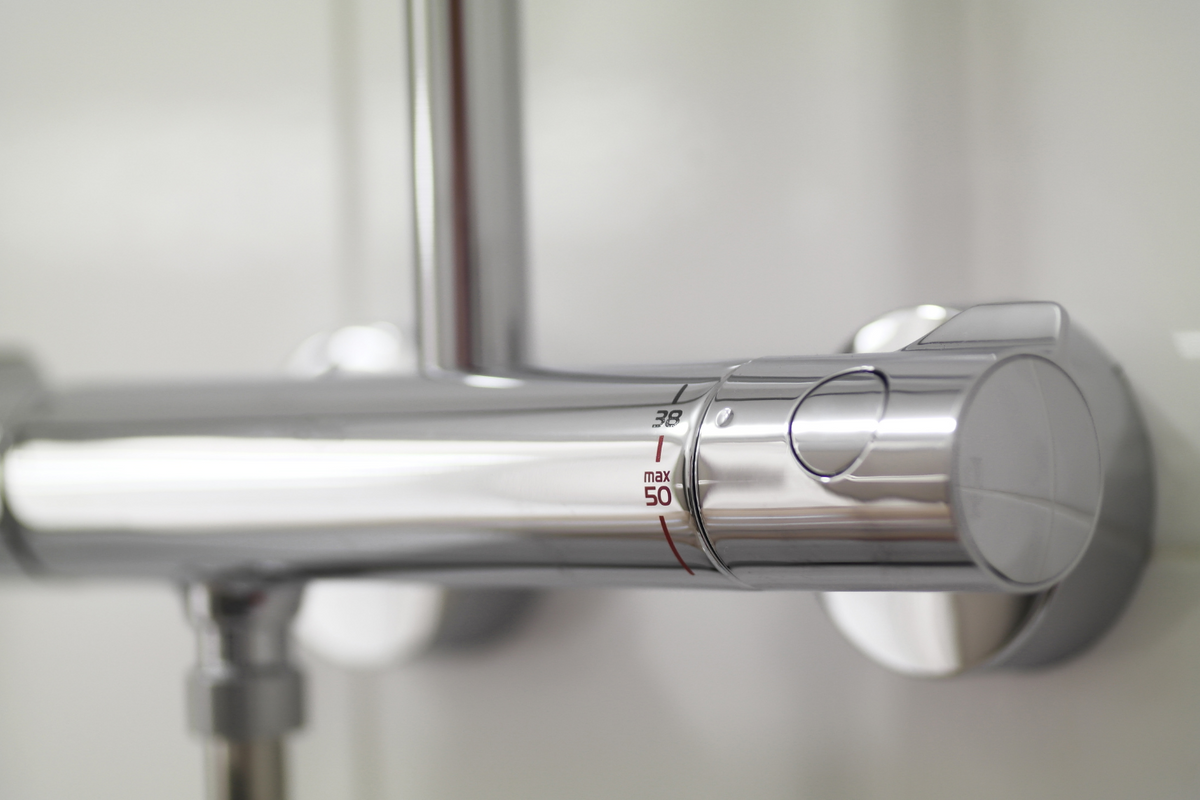 FREE UK DELIVERY.
EXPRESS OPTIONS AVAILABLE
FREE UK DELIVERY.
EXPRESS OPTIONS AVAILABLE

Thermostatic Shower vs Electric Shower: Which is Best for You?
|
|
Time to read 6 min
 FREE UK DELIVERY.
EXPRESS OPTIONS AVAILABLE
FREE UK DELIVERY.
EXPRESS OPTIONS AVAILABLE
 UP TO 10 YEARS GUARANTEE
FOR PEACE OF MIND
UP TO 10 YEARS GUARANTEE
FOR PEACE OF MIND
 30 DAY RETURNS
NO QUIBBLE GUARANTEE
30 DAY RETURNS
NO QUIBBLE GUARANTEE

|
|
Time to read 6 min
Trying to decide whether to get a thermostatic or electric shower for your bathroom renovation?
Both have their pros and cons, so it can be tough to make a decision. Luckily, we're here to help.
In this blog post, we'll go over the main differences between thermostatic and electric showers, as well as the pros and cons of each. By the end, you should have a better idea of which type of shower is right for your needs.
Thermostatic showers offer consistent water temperature, ideal for households with fluctuating water pressure, while electric showers heat water on demand, ensuring hot water regardless of external factors.
Electric showers are generally more energy-efficient since they only heat the water you use, making them a good choice for energy-conscious homeowners.
The biggest difference between thermostatic and electric showers is how they heat the water. Thermostatic showers are supplied with hot and cold water that is mixed. Electric showers, on the other hand, are supplied with cold water only, which is heated using electricity as it flows through the unit.
Thermostatic showers are temperature-controlled, which means that they maintain a consistent desired temperature even if the water pressure fluctuates. This is achieved by mixing hot and cold water before it enters the shower head, which ensures that the water temperature will remain constant even if someone else in your household turns on a water-using appliance, such as a basin tap, dishwasher or washing machine.
One of the main advantages of thermostatic showers is that they're safer than electric showers, since there's no risk of scalding yourself with sudden changes in water temperature. This means that you can enjoy a consistent stream of hot water without worrying about the temperature suddenly going bonkers.
A thermostatic shower can be a great option if you have small children or elderly family members in your home, as you can be sure that the water won't be too hot or too cold for them, even in the event of a disruption to the hot or cold water supply. Thermostatic showers also tend to have more temperature settings than electric showers, so you can find the perfect setting for your needs.
They're also more energy-efficient since they don't require as much electricity to heat the water to maintain a consistent temperature. One downside of thermostatic showers is that they tend to be more expensive than electric showers, but having said this, they also tend to last longer since they don't have any exposed heating elements that can break down over time.
Electric showers, on the other hand, are known for their instant hot water delivery. Since they heat the water as it passes through the unit, there's no need to wait for the water to heat up before you get in—which means you can save time in the morning, or whenever you shower.
Electric showers tend to be more affordable than other types of showers. However, one downside of electric showers is that they can't be used if there's no mains water supply. And if your home experiences regular power outages, an electric shower might not be the best option for you.
Because they work by heating water as it passes through the unit, electric showers have higher energy usage than thermostatic showers. They are also generally less safe than thermostatic showers since there's a risk of scalding yourself if the water temperature suddenly changes.
Selecting a new shower can feel more straightforward if you break it down into a few key decisions. Use this checklist to guide you:
Think about whether you prefer a thermostatic shower for steady temperatures, an electric shower that heats water on demand, or a power shower for stronger water pressure.
How many shower outlets do you need? You could choose a 1 outlet shower system, a 2 outlet shower system, or a 3 outlet shower system. The right pick often depends on your available space and the features you want.
Consider whether you lean toward traditional showers in antique bronze or modern showers in black. Reflect on the overall décor and any accessories you already own.
The amount of space you have will help you decide on the ideal shower size and design. Check out our Easy Ways to Make Your Small Bathroom Feel Bigger article for tips on making the most of smaller areas.
Shower systems can range widely in price, so allocate enough funds for the features and style you really want. Browse our Shower sets to see different options.
If you need more help deciding which type of shower suits you, take a look at The Shower Buying Guide. It outlines the pros and cons of different shower types, helping you match the right option to your home and lifestyle.
As you can see, there are a few key differences between thermostatic and electric showers, and the debate between them is one that's sure to continue. Ultimately, the best type of shower for you will depend on your budget, your needs, and your personal preferences.
Still need help choosing the perfect shower for your home? Our team of bathroom experts are always here to help. Contact us today and we'll be happy to answer any questions you have.
A mixer shower is a type of shower that mixes hot and cold water supplies together to create the perfect temperature for you.
A digital shower is a type of mixer shower that allows you to control the water temperature and flow rate using a digital display, unlike a manual mixer shower which uses a traditional knob to control the mix of water. If you want complete control over your shower, this may be the right option for you. Digital showers typically have a thermostat, which allows you to choose a pre-set temperature before turning on the shower.
Exposed shower valves are installed on the outside of your shower, while concealed shower valves are installed inside the wall. Concealed shower valves are becoming increasingly popular since they give your bathroom a sleek and seamless look. Bar shower valves are another type of valve that allows you to control multiple shower functions, such as water temperature and flow rate, from one central location. The shower valve you choose will depend on your personal preferences.
An anti-scald device is a mechanism that prevents scalding by limiting the maximum water temperature that can be reached. This is especially important in showers since sudden changes in water temperature can cause serious burns. Anti-scald devices are typically found in thermostatic showers, but some electric showers also have them.
If you're installing an electric shower for the first time, you'll need to have both a plumber and an electrician do the work. The plumber will install the water pipe that feeds into the shower, and the electrician will connect the shower to the mains electricity supply.


